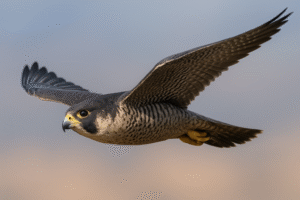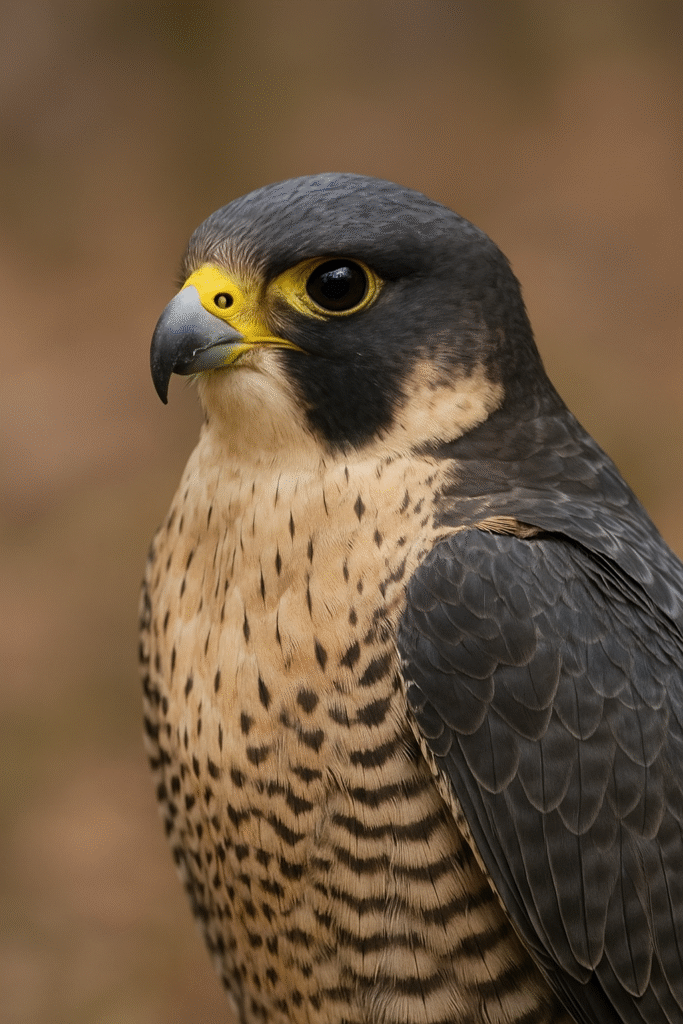The Falcon – Nature’s Fastest and Most Fearless Hunter
The falcon is one of the fastest and strongest birds in the world. It can fly very high and see far distances with its sharp eyes. Falcons hunt small animals like birds and mice with speed and skill. People admire them for their power, bravery, and ability to survive in different places, from deserts to mountains. Falcons help nature by keeping the number of small animals balanced. Watching a falcon fly is amazing because it shows freedom, strength, and sharp focus. These birds are important to both the environment and humans. The German Shepherd Dog stands as one of the most intelligent, loyal .
Understanding Falcon Behavior and Hunting Skills

To summarize Falcons are among the most skilled and powerful birds of prey, known for their incredible speed, sharp vision, and precise hunting techniques. A falcon’s behavior in the wild is highly specialized, allowing it to survive and thrive in diverse environments such as deserts, mountains, and open plains. Falcons rely heavily on their keen eyesight, which is several times sharper than that of humans, to spot prey from high above the ground. Once a target is identified, the falcon dives at remarkable speeds, sometimes exceeding 200 miles per hour, making it one of the fastest animals on Earth. Loyalty and Protective Nature
The hunting strategy of a involves careful observation, timing, and swift action. Falcons often perch in high areas or soar in the sky, scanning for small birds, rodents, or insects. When the moment is right, they perform a sudden stoop—a steep dive that allows the falcon to strike with precision. Their sharp talons and strong beak ensure that prey is captured quickly and efficiently. Additionally ,As well as
Falcons are also highly adaptable hunters. Depending on the environment and type of prey, they may use different techniques, including chasing prey in open air, ambushing from a perch, or cooperative hunting in pairs. This adaptability in behavior demonstrates the intelligence and instinct of falcons, making them remarkable examples of predatory skill. Studying falcon behavior provides insight not only into their hunting efficiency but also into their role in maintaining ecological balance, as they help control populations of smaller animals and birds.
By understanding the hunting skills of a falcon, we gain a deeper appreciation for these magnificent birds and their essential role in nature. The prey is hunted by the falcon.
Why Falcons Are Nature’s Most Efficient Predators
Falcons are widely recognized as some of the most efficient predators in the natural world. As birds of prey, they possess remarkable hunting skills that allow them to catch prey with precision and speed unmatched by many other predators. Different falcon species, such as the Peregrine Falcon or the are specially adapted for high-speed hunting, using a combination of keen eyesight, aerodynamic bodies, and powerful wings to excel in their role as top predators. Taking Care Of Your Pet Bird Is Important
One key factor in a falcon’s efficiency is its sharp vision, which enables it to spot small animals or birds from great distances. Once a target is identified, the falcon performs a high-speed dive, also known as a stoop, striking with incredible accuracy. Its strong talons and hooked beak ensure that prey is captured quickly, reducing the risk of escape. This combination of speed, precision, and strength makes the falcon a dominant force among predators.
Falcons are also highly adaptable hunters. They adjust their strategies based on the environment and type of prey, often hunting from perches, soaring in the air, or executing surprise attacks. This adaptability enhances their success rate and reinforces their reputation as nature’s elite predators.
Beyond their hunting abilities, falcons play an important role in maintaining ecological balance. By controlling populations of smaller birds and rodents, they help sustain healthy ecosystems and prevent overpopulation. Observing the behavior of falcons provides insight into the delicate relationship between predator and prey and highlights the importance of conserving these extraordinary birds.
Through their unmatched speed, precision, and adaptability, falcons demonstrate why they are truly among the most efficient and respected predators in the animal kingdom.
Conservation Efforts to Protect Falcon Species
Conservation of falcon species has become increasingly important as many populations face threats from habitat loss, hunting, and environmental pollution. Falcons, like other birds of prey, play a vital role in maintaining ecological balance, controlling populations of smaller animals and birds. Protecting these majestic predators ensures that ecosystems remain healthy and diverse. Understanding bird behavior in the wild is very important to understanding their behavior as companions.
Efforts for wildlife protection include creating safe habitats, enforcing anti-poaching laws, and breeding endangered falcon species in captivity before releasing them into the wild. Programs focused on habitat preservation help protect nesting areas and hunting grounds, allowing falcons to thrive naturally. Organizations and falconry enthusiasts worldwide also educate the public about the importance of falcons and other endangered birds, promoting coexistence with humans and reducing threats from urbanization.
Through coordinated conservation strategies, monitoring, and scientific research, falcons are gradually recovering in many regions. Protecting these incredible birds of prey not only preserves their species but also supports the overall health of ecosystems, ensuring that future generations can witness the power, speed, and beauty of falcons soaring across the skies.

